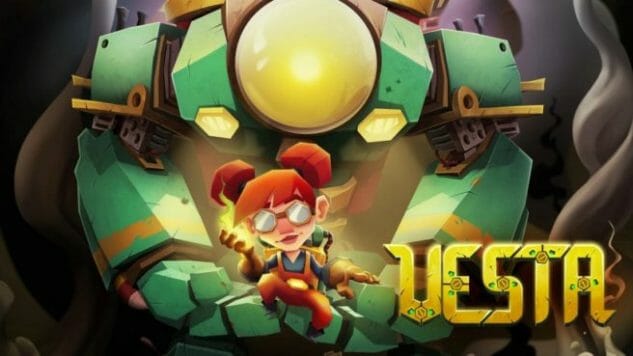
I’m a firm believer that games don’t need to replicate movies or films in order to be reputable or valuable, but I do think games are lacking in coming-of-age stories. The few that exist prove that the genre can work wonderfully under an interactive format. So why aren’t there more of them?
So many games feature young protagonists, but very few explore what it really means to discover who you are as a person, or to realize the daily heroism it requires just to make it through this world, and what all that responsibility can mean to a child.
In Vesta, a new game by FinalBoss Games, the eponymous hero is a 6-year-old girl who is the only human living in the ruins of an old city. What was once inhabited by both humans and robots is now populated only by machines intent on killing her. Vesta has no knowledge of what happened to the previous humans, but hidden around the ruins are secrets that help explain the series of events that eventually lead to the main robot, MUM, becoming the leader of all robots.
I really wanted the game to be a peek into Vesta’s life as a girl growing up with the few friendly robots who refuse to kill her. But unfortunately Vesta’s humanity takes a backseat to what happened to the humans before her. The game repeatedly makes it known that most robots thought all the humans were gone. The robots were once tasked with the job to keep all the humans alive; when they see Vesta, some nonviolent robots believe they still have a chance at fulfilling their objective.
But the game doesn’t provide Vesta any time to think about her role or place as the only human around. She’s determined to reach MUM to learn the truth, but even when Vesta does learn the truth about herself, MUM and the missing humans, we don’t see how it impacts her as a person. The game suddenly ends after that realization. I felt more enjoyment finding hidden letters and diary entries than actually going through the game, which feels frustrating and awkward to play.
I want more games that question the obligation to change or save the world. I want more rebellious teens and small moments of humanity that remind the player that they are controlling a fallible character. I want more games that seem even remotely familiar with how real people live their lives.
When Link takes a look at himself in Ocarina of Time and discovers that he’s grown from a small adolescent to a young adult, he’s shocked for only a moment before he moves on with his mission to save Princess Zelda. For the player, nothing about Link is different beyond a few weapons that are now unavailable, and a deeper voice coming out of Link’s throat. But I’ve always wondered how Link felt, rolling around in his new, yet not-new, body. For an entire adventure, Link speeds through puberty; he practically toys with it, going back and forth between young and old as if nothing but time changes. But everything has changed. Zora’s Domain is completely frozen, the villagers of Kakariko are in hiding, and Hyrule Castle Town is full of monsters. But, equally important, Link is several feet taller, possibly pimple-ridden, and covered in hair on unfamiliar body parts.
I think of Vesta and Link together because they’re both young, both awakened from a deep sleep to find that their worlds need them, and that their childhoods will never be the same once they leave their bed. There’s certainly some games that do explore the trauma of a child who has to grow up too quickly. Life Is Strange, Oxenfree, Night in the Woods and even The Last of Us take some time to explore the end of adolescence. I wished Vesta could be a part of that list, but unfortunately the game never spends enough time on its main character. It made me yearn for a game that lets a young heroine just sit for a second and question her existence.
Shonté Daniels is a poet who occasionally writes about games. Her games writing has appeared in Kill Screen, Motherboard, Waypoint and elsewhere. Her poetry can be seen at Puerto del Sol, Baltimore Review, Phoebe, and others literary journals. Check out Shonte-Daniels.com a full archive, or follow her for sporadic tweeting.